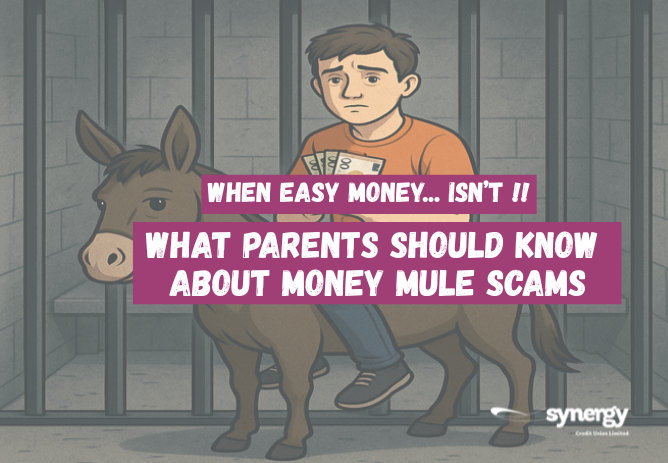22 September 2025
Money Mule Fraud
When Easy Money Isn’t: What Parents Should Know About Money Mule Scams
These days it seems like everyone is looking for ways to earn extra cash — side gigs, online opportunities, even offers via social media that sound fair-too-good-to-be-true. Sadly, many of those “opportunities” are traps. One of the fastest‐growing scams among young people (teenagers, young adults) involves being recruited as a money mule.
We want you to be fully aware of what this means, what the risks are — both now and in the future — and how you can protect your children (and yourself).
What Is a Money Mule?
A money mule is someone who agrees to receive money (often stolen or obtained by fraud) into their bank account and then forwards it to another account — usually in return for keeping a small commission or “gift.” Sometimes it starts with phone calls, social media messages, or even distant “jobs” that ask for remote access to a computer or laptop. Often the person promising “easy money” will ask the target to install software, give access to a device, or open financial accounts or do transfers on their behalf.
Recent Trends & Why They’re Alarming
Based on a recent FraudSMART report in Ireland:
- Almost €9.4 million was laundered through money mule accounts from mid-2024 to mid-2025.
- Many of the cases involve young people: 18-24-year-olds are disproportionately targeted, but there are instances involving children as young as 14.
- A surprising number of young people didn’t know the meaning of “money mule,” or realise that this is a crime. Over 30% didn’t understand they could face jail time; many didn’t know it could affect visas, travel, future employment.
- Over 60% of parents have not discussed this topic with their children.
See here : https://www.fraudsmart.ie/our-campaigns/money-mule/
The Dangers and Long-Term Implications
For Parents: These scams may seem distant, but if your child becomes involved, the consequences ripple outward. Some of the potential harms include:
Legal Consequences
It is money laundering. Even if your child “just followed instructions,” the law may see them as participating in illegal activity. Jail sentences are possible.
Financial Consequences
The money involved could come out of your child’s account; banks may freeze or close accounts. There may be liability for losses, fees, or even prosecution costs.
Impact on Travel & Immigration
Being convicted, or even under suspicion, can make it harder to get travel visas or travel abroad (e.g. working, studying, or holidaying) depending on your destination.
Reputation & Future Work / Education
Employers often do background and character checks. Being linked (even unwittingly) to fraud or financial crime can harm reputation, opportunities, trust. Digital footprints remain: social media posts, messages, or online volunteering to be a mule could be discovered later.
Emotional & Mental Toll
Shock, guilt, fear, family conflict. Having to deal with law enforcement or investigations can be stressful for both children and parents.
How These Scams Often Work
To help you recognise danger signs, here are some common patterns:
- A message (on Instagram, TikTok, Snapchat, Facebook, WhatsApp) offering “easy” income, often from overseas or unknown “companies.”
- Being asked to use your own bank account (or your child’s) to receive payments and forward them.
- Instructions to install remote access software or give someone control of your laptop/computer.
- Promises of keeping a cut of money transfers.
- Pressure not to tell anyone (family, friends, teachers).
- Job adverts that seem vague — no company name, no address, just contact via DM or messenger
What You Should Tell Your Child
As a parent, a proactive conversation can help prevent problems. You may wish to cover:
- That if something sounds too good to be true, it probably is.
- Always talk to you (or a trusted adult) before agreeing to any role that involves someone else controlling a device, giving remote access, using their account, or transferring money for someone else.
- To check with you (or you check together) the legitimacy of any online offer. Google, reviews, company registration, ask for references.
- That opening up about being approached is never “getting them in trouble” — it's staying safe.
What to Do If You Suspect Something Already Happened
If you or your child have already been approached, or worse, have already been part of something that feels suspicious:
- Stop all communication with the person asking, and do not proceed with transfers, remote access, or opening accounts.
- Contact your bank immediately if any transactions have been made or accessed.
- Report to An Garda Síochána — the gardai have units dealing with economic crime.
- Keep records: messages, screenshots, names, bank statements. These will help if there is an investigation.
- Seek professional advice if necessary — legal aid, or consumer or legal-support services.
Final Thought
These scams are evolving fast. Criminals are clever, persuasive, and often exploit social media and peer pressure. While they may promise "easy cash" or "simple tasks," the fallout — legal, financial, personal — can last many years.
Parents: having open, non-judgmental conversations with your children is one of the best defenses. Teach them to ask questions, to check legitimacy, to pause before acting. Being safe online isn’t just about passwords or social media settings — sometimes it’s about being alert to what feels wrong.
Let’s stay vigilant. Let’s help keep our children from becoming unwilling participants in crime.



